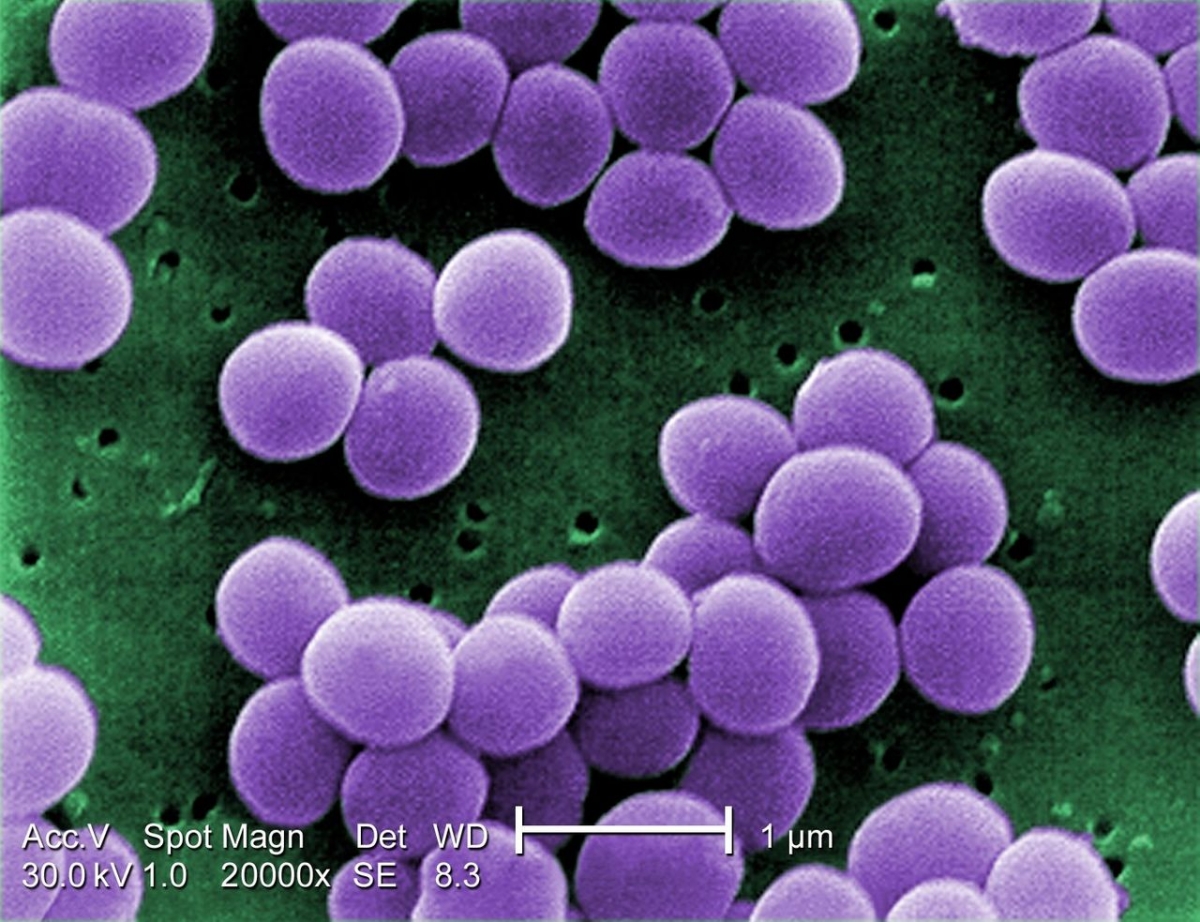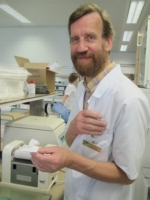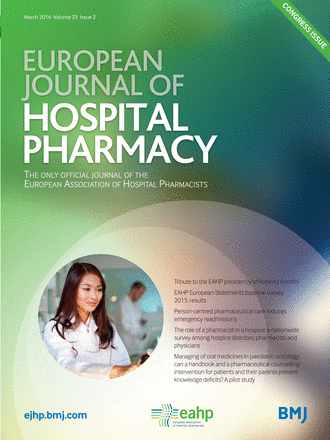 The EAHP EU Monitor is a regular round up of news relevant to hospital pharmacy in Europe.
The EAHP EU Monitor is a regular round up of news relevant to hospital pharmacy in Europe.
You can subscribe to receive the EAHP EU Monitor by email here.
 HOSPITAL PHARMACISTS AT THE HEART OF MEETING THE AGEING SOCIETY CHALLENGE
HOSPITAL PHARMACISTS AT THE HEART OF MEETING THE AGEING SOCIETY CHALLENGE
Ahead of its annual Congress in Vienna, the European Association of Hospital Pharmacists (EAHP) has published a new policy statement highlighting the important role of hospital pharmacists in meeting the pan-European challenge of an ageing society.
More information here.
.jpg) WORLD HEALTH ORGANISATION OFFERS NEW PLAN ON MEDICINE SHORTAGES
WORLD HEALTH ORGANISATION OFFERS NEW PLAN ON MEDICINE SHORTAGES
The secretariat of the World Health Organisation (WHO) has recently published a paper contributing its thoughts on potential mechanisms to address the globally experienced problem of medicines shortages.
Amongst the key points in the paper are:
- The suggestion that the “common denominator” for global medicines shortages “are products that are mostly old, off-patent or difficult to formulate and that have a tightly-defined shelf life and few or a sole manufacturer”
- Factors that the WHO believe worsen the shortages situation include: “poor availability and quality of data on actual demand; inadequate management practices in procurement and the supply chain, combined with large tender contracts that do not sufficiently define quality standards but whose sole emphasis is on obtaining the lowest prices; and too small profit margins for manufacturers.”
- Negative impacts of shortages include: inability to fulfill prescriptions as well as poor quality prescribing and poor use of medicines. “The results are poor health outcomes, which have been documented, for example, in relation to mortality in children owing to lack of cancer treatment and to inappropriate use of antibiotics when first-line regimens are not available”.
The report goes on to suggest the need for “mechanisms for combining and sharing notifications for global scrutiny of the status of the supply of individual medicines”.
Explaining the rationale, the WHO state: “As the supply of pharmaceuticals is a multinational business, having a system for comprehensive evaluation and a future global monitoring mechanism for that supply in place, would anticipate and detect early shortages and assist the development of a joint rapid response mechanism to encourage countries, the international community and other relevant stakeholders to cooperate in developing a joint rapid response.”
Commenting on the report, EAHP Board Member Aida Batista, policy lead on shortages, remarked:
“This latest intervention from the World Health Organisation (WHO) is very welcome, particularly the section dealing with the patient impact of shortages. As EAHP surveys have shown, medicines shortages are a global problem, and so require global solutions. Improving international regulatory cooperation, as well as available information systems about shortages, as suggested in this paper, could not be more strongly supported by the European Association of Hospital Pharmacists. We hope the message is beginning to filter through to those in the regulatory community with the capacity to act.”
A summary of the paper by the Regulatory Affairs Professional Society (RAPS) is available here.
Full paper here.
 LATEST EVIDENCE PRESENTED OF RISING ANTIMICROBIAL RESISTANCE IN EUROPE
LATEST EVIDENCE PRESENTED OF RISING ANTIMICROBIAL RESISTANCE IN EUROPE
A recent joint report by the European Centre for Disease Prevention and Control (ECDC) and the European Food Safety Authority has confirmed increasing problems of antimicrobial resistance across EU countries.
‘The European Union summary report on antimicrobial resistance in zoonotic and indicator bacteria from humans, animals and food in 2014’ is an analysis of data submitted by the EU’s 28 Member Countries.
Headline aspects of the report include evidence of growing resistance to antimicrobials used to treat Campylobacteriosis and Salmonellosis, the two most common reported foodborne diseases in Europe.
For Campylobacteriosis, resistance to widely used antimicrobials, such as ciprofloxacin, was commonly detected in bacteria from humans and poultry. High to extremely high resistance to ciprofloxacin was observed in broilers (69.8%), as well as in bacteria from humans (60.2%). High to extremely high resistance to nalidixic acid and to tetracyclines was reported in broilers.
Resistance to widely used antimicrobials was commonly detected in Salmonella from humans (tetracyclines 30%, sulphonamides 28.2%, ampicillin 28.2%) and poultry.
The report authors also detected resistance to “last resort” drug colistin in EU poultry.
“This last resort drug may soon no longer be effective for treating severe human interactions with salmonella” said ECDC chief scientist Mike Catchpole.
EAHP Vice-President Tajda Miharija Gala, who leads EAHP representations on the topic of antimicrobial resistance, said: “This report marks yet another wake up call, as if needed, that the European Commission’s next Action Plan on antimicrobial resistance must exhibit more ambition and rigour than its previous version. That should include better defining the role of healthcare professionals in meeting the challenge. EAHP advocate placing hospital pharmacists at the forefront of all national plans for achieving more prudent use and better antibiotic stewardship in the hospital sector.”
ECDC summary here.
Full report here.
 #EAHP16 SNEAK PEEK: HOSPITAL PHARMACISTS TAKING THE LEAD IN ORPHAN DRUGS
#EAHP16 SNEAK PEEK: HOSPITAL PHARMACISTS TAKING THE LEAD IN ORPHAN DRUGS
With just two weeks until the 21st Congress of the EAHP in Vienna (16th to 18th March 2016), the EU Monitor takes a brief time out to ask session presenter and orphan drugs specialist Marc Dooms what attendees might expect.
Can you tell us a bit about your background as a specialist in orphan drugs, and how this came to be your specialism?
For many years we have been compounding in the pharmacy of the university hospital medication for patients with a rare disease. Many of them are now authorized orphan drugs (Carbaglu, Cystadane, Cystagon, Firdapse, Gliolan, Granupas, Kolbam, Orfadin, Pedea, Peyona, Wilzin). Later on we started to contribute in several multi-disciplinary teams around patients with rare disorders such as total parenteral nutrition for short bowel disease, home treatment for cystic fibrosis-hemophilia-pulmonary arterial hypertension, seamless care with pediatric oncology patients, reimbursement issues for high cost medication, adherence in oncology consultations etc.
The title of the session is “Hospital Pharmacists taking the lead in Orphan Drugs: supply chain, partnerships and technologies”. Can you tell us a bit more about what you intend to cover under those banners?
I will start from scratch and explain every issue around orphan drugs. But mainly I will focus on the subject of this meeting: partnerships (Public Private Partnerships, patient organizations, Patient Reported Outcome Measures, reimbursement agreements) and technologies (advanced therapy medicinal products, drones, 3D printing, personalized medicine, companion genetic testing, integrated systems, wearable’s).
Finally, it seems to us that Orphan Drugs is becoming something of a “hot topic” at the European level with debates on regulation and pricing approaches apparently growing in profile. Would you agree, and can you say any more about that?
Yes, I agree. Orphan drugs (118 approved by EMA) are still a small market today but it is a pilot study for future challenges such as solidarity, ethics, societal values, innovation and cost. In the beginning only small and medium sized enterprises were involved but today Big Pharma takes the market. Diagnostic methods also became much better what resulted in more precise diagnoses and better treatments.
More information about the session
here.
Information about the full Congress programme
here.
More information about the Congress in general, including registration,
here.
 EJHP: MARCH 2016 EDITION NOW ONLINE!
EJHP: MARCH 2016 EDITION NOW ONLINE!
The March 2016 edition of the European Journal of Hospital Pharmacy is now available online. Highlights of the edition include a series of articles exploring the results of EAHP’s 2015 Surveys of Practice, and an article examining how person centred care can reduce emergency readmissions. The edition also includes a UK study on pharmacist transcribing of drug histories to drug charts, and an exploration of the role of the pharmacist in a hospice.
Edition here.
























 The EAHP EU Monitor is a regular round up of news relevant to hospital pharmacy in Europe.
The EAHP EU Monitor is a regular round up of news relevant to hospital pharmacy in Europe. HOSPITAL PHARMACISTS AT THE HEART OF MEETING THE AGEING SOCIETY CHALLENGE
HOSPITAL PHARMACISTS AT THE HEART OF MEETING THE AGEING SOCIETY CHALLENGE.jpg) WORLD HEALTH ORGANISATION OFFERS NEW PLAN ON MEDICINE SHORTAGES
WORLD HEALTH ORGANISATION OFFERS NEW PLAN ON MEDICINE SHORTAGES LATEST EVIDENCE PRESENTED OF RISING ANTIMICROBIAL RESISTANCE IN EUROPE
LATEST EVIDENCE PRESENTED OF RISING ANTIMICROBIAL RESISTANCE IN EUROPE #EAHP16 SNEAK PEEK: HOSPITAL PHARMACISTS TAKING THE LEAD IN ORPHAN DRUGS
#EAHP16 SNEAK PEEK: HOSPITAL PHARMACISTS TAKING THE LEAD IN ORPHAN DRUGS  EJHP: MARCH 2016 EDITION NOW ONLINE!
EJHP: MARCH 2016 EDITION NOW ONLINE!